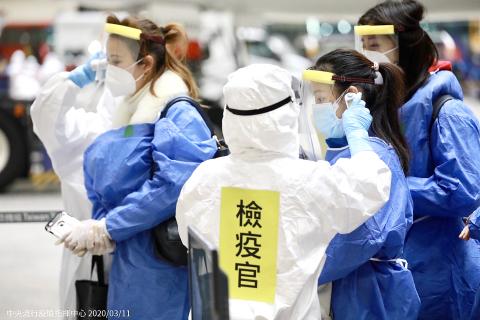A China Airlines (中華航空) charter flight to evacuate Taiwanese stranded in China on Tuesday was delayed by Chinese authorities, who unilaterally attempted to make last-minute changes to the passenger manifest, an anonymous source said yesterday.
Just before the flight was scheduled to depart Hubei Province at 5pm, Chinese authorities attempted to add 30 passengers not on the original manifest, saying that there was “enough room in the cabin,” the source said.
They also refused to let passengers don protective clothing, saying it was “unnecessary,” the source said.

Photo courtesy of the Central Epidemic Command Center
The two maneuvers caused the flight to be delayed until 9:46pm, as the Central Epidemic Command Center and other medical authorities in Taiwan refused to accept the moves, creating a four-hour stalemate, until the passengers were allowed to don protective clothing and board the aircraft, the source added.
A separate charter flight operated by China Eastern Airlines (中國東方航空) was also delayed and arrived in Taiwan at 4:08am yesterday.
Although the Chinese authorities had claimed that protective clothing was unnecessary, the China Eastern Airlines flight crew all wore protective gear, the source said, citing a Taiwanese passenger on the flight.
Despite the delays caused by the Chinese authorities not respecting Taiwan’s health and quarantine regulations, Xinhua news agency yesterday reported that the Taiwanese government was “obstructing Taiwanese from returning home,” the source said.
A Hubei official in charge of Taiwan-related issues also lambasted Taipei for not allowing the 30 additional passengers to board either flight, the source said.
The Hubei Provincial Government’s Taiwan Affairs Office said in a statement that the Taiwanese government had rejected its suggestion that 30 people on a waiting list be allowed to fill vacant seats.
Asked about the statement, Minister of Health and Welfare Chen Shih-chung (陳時中) said: “It is very important that we get the passenger list beforehand so that we can make arrangements for their isolation and quarantine, and to monitor their health, as well as settling them in quarantine centers after they return to Taiwan.”
“We did not feel safe transporting passengers who were suddenly put on the list, so we refused to let them board the airplane,” said Chen, who heads the Central Epidemic Command Center.
Meanwhile, Chinese Nationalist Party (KMT) Chairman Johnny Chiang (江啟臣) said that politics should neither obstruct the return of Taiwanese nor “cause a hole” in epidemic prevention efforts.
“If governments squabble at a time like this, it is only common people who get hurt. Diseases knows no borders — I hope that both sides can put aside politics and communicate effectively,” he said.
“Health knows no borders. Taking good care of the nation’s citizens is the government’s most important task,” President Tsai Ing-wen (蔡英文) later wrote on Facebook, adding that there were “no political considerations” involved in the officials’ rejection of additional passengers who were not on the charter flights’ original manifests.
Additional reporting by Lee I-chia and CNA

CHAOS: Iranians took to the streets playing celebratory music after reports of Khamenei’s death on Saturday, while mourners also gathered in Tehran yesterday Iranian Supreme Leader Ayatollah Ali Khamenei was killed in a major attack on Iran launched by Israel and the US, throwing the future of the Islamic republic into doubt and raising the risk of regional instability. Iranian state television and the state-run IRNA news agency announced the 86-year-old’s death early yesterday. US President Donald Trump said it gave Iranians their “greatest chance” to “take back” their country. The announcements came after a joint US and Israeli aerial bombardment that targeted Iranian military and governmental sites. Trump said the “heavy and pinpoint bombing” would continue through the week or as long

TRUST: The KMT said it respected the US’ timing and considerations, and hoped it would continue to honor its commitments to helping Taiwan bolster its defenses and deterrence US President Donald Trump is delaying a multibillion-dollar arms sale to Taiwan to ensure his visit to Beijing is successful, a New York Times report said. The weapons sales package has stalled in the US Department of State, the report said, citing US officials it did not identify. The White House has told agencies not to push forward ahead of Trump’s meeting with Chinese President Xi Jinping (習近平), it said. The two last month held a phone call to discuss trade and geopolitical flashpoints ahead of the summit. Xi raised the Taiwan issue and urged the US to handle arms sales to

State-run CPC Corp, Taiwan (CPC, 台灣中油) yesterday said that it had confirmed on Saturday night with its liquefied natural gas (LNG) and crude oil suppliers that shipments are proceeding as scheduled and that domestic supplies remain unaffected. The CPC yesterday announced the gasoline and diesel prices will rise by NT$0.2 and NT$0.4 per liter, respectively, starting Monday, citing Middle East tensions and blizzards in the eastern United States. CPC also iterated it has been reducing the proportion of crude oil imports from the Middle East and diversifying its supply sources in the past few years in response to geopolitical risks, expanding

Pro-democracy media tycoon Jimmy Lai’s (黎智英) fraud conviction and prison sentence were yesterday overturned by a Hong Kong court, in a surprise legal decision that comes soon after Lai was jailed for 20 years on a separate national security charge. Judges Jeremy Poon (潘兆初), Anthea Pang (彭寶琴) and Derek Pang (彭偉昌) said in the judgement that they allowed the appeal from Lai, and another defendant in the case, to proceed, as a lower court judge had “erred.” “The Court of Appeal gave them leave to appeal against their conviction, allowed their appeals, quashed the convictions and set aside the sentences,” the judges